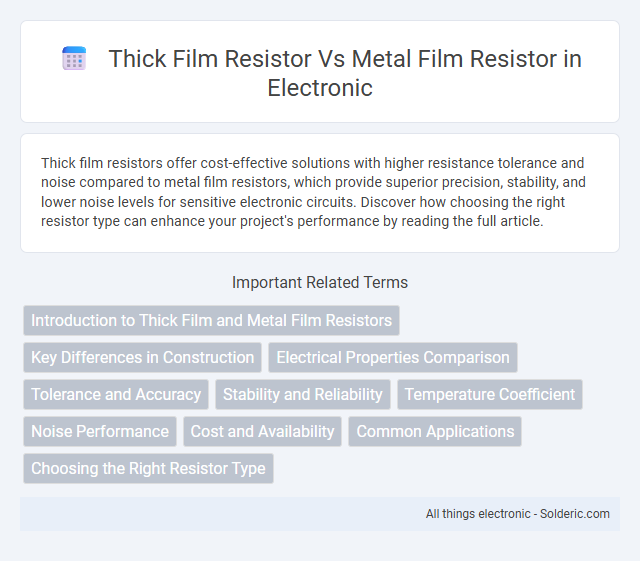Thick film resistors offer cost-effective solutions with higher resistance tolerance and noise compared to metal film resistors, which provide superior precision, stability, and lower noise levels for sensitive electronic circuits. Discover how choosing the right resistor type can enhance your project's performance by reading the full article.
Comparison Table
| Feature | Thick Film Resistor | Metal Film Resistor |
|---|---|---|
| Material | Ceramic substrate with thick film paste | Metal alloy film on ceramic core |
| Resistance Accuracy | +-5% to +-10% | +-1% to +-2% |
| Temperature Coefficient | +-200 ppm/degC or higher | +-50 ppm/degC or lower |
| Noise Level | Higher noise | Low noise |
| Power Rating | Typically 0.125W to 1W | Typically 0.25W to 2W |
| Cost | Lower cost | Higher cost |
| Applications | General purpose, low-cost circuits | Precision circuits, audio, measurement |
| Stability | Moderate stability | High stability |
Introduction to Thick Film and Metal Film Resistors
Thick film resistors are created by depositing a paste of resistive material onto an insulating substrate, offering cost-effective and versatile resistance solutions with moderate tolerance and stability. Metal film resistors feature a thin metal layer sputtered onto a ceramic base, providing higher precision, better temperature stability, and lower noise performance. Your choice depends on the desired balance between accuracy, durability, and application-specific requirements.
Key Differences in Construction
Thick film resistors feature a ceramic substrate with a layer of resistive paste applied and fired, resulting in a relatively coarse structure. Metal film resistors consist of a thin metal layer deposited on an insulating substrate using sputtering or evaporation for precise resistance control. The construction differences impact tolerance, noise, and stability, with metal film resistors offering tighter tolerance and better electrical performance due to their uniform thin film.
Electrical Properties Comparison
Thick film resistors exhibit higher noise levels and less stability under temperature variations compared to metal film resistors, which provide superior accuracy and lower temperature coefficients typically around +-50 ppm/degC. Metal film resistors offer tighter tolerance ranges, often as low as +-0.1%, whereas thick film resistors usually come with tolerances around +-1% or higher. Electrical performance differences make metal film resistors preferable for precision circuits demanding stable resistance and low noise.
Tolerance and Accuracy
Thick film resistors typically offer tolerance ranges between +-1% to +-10%, making them less accurate compared to metal film resistors, which commonly provide tighter tolerances as low as +-0.1% to +-1%. Metal film resistors deliver higher precision due to their uniform film deposition and stable resistance values, essential for circuits requiring exact performance. The superior accuracy and low temperature coefficient of metal film resistors make them ideal for precision applications over the broader tolerance and variability found in thick film types.
Stability and Reliability
Thick film resistors exhibit moderate stability and reliability, often affected by environmental factors like humidity and temperature fluctuations, which can lead to drift over time. Metal film resistors demonstrate superior stability with low tolerance and temperature coefficients, ensuring consistent performance in precision applications. Your choice between these types depends on the required long-term reliability and environmental conditions where the resistor will be used.
Temperature Coefficient
Thick film resistors typically have a higher temperature coefficient of resistance (TCR), ranging from +-100 ppm/degC to +-350 ppm/degC, which can lead to greater resistance variation with temperature changes. Metal film resistors offer a much lower TCR, often as low as +-5 ppm/degC to +-50 ppm/degC, providing superior stability and accuracy over a broad temperature range. When your application demands minimal resistance drift and precision across temperature fluctuations, metal film resistors are the more reliable choice.
Noise Performance
Thick film resistors typically exhibit higher noise levels due to their granular structure and the presence of binders, which contribute to excess noise under varying electrical conditions. Metal film resistors, made with a thin metal layer deposited on a ceramic substrate, provide superior noise performance with lower excess noise and better stability, making them ideal for precision circuits. Choosing metal film resistors for your application ensures reduced noise interference and improved signal integrity.
Cost and Availability
Thick film resistors are generally more cost-effective and widely available due to their simpler manufacturing process and application in high-volume production. Metal film resistors, while offering better precision and stability, tend to be more expensive and less common in bulk markets. Your choice depends on budget constraints and the required accuracy for your electronic projects.
Common Applications
Thick film resistors are commonly used in general-purpose applications such as automotive electronics, household appliances, and industrial equipment due to their cost-effectiveness and ability to handle higher power loads. Metal film resistors find extensive use in precision electronic circuits like audio equipment, measurement instruments, and aerospace systems because of their superior accuracy, stability, and low noise characteristics. Both types serve essential roles, with thick film favored for robustness and metal film preferred for high-precision requirements.
Choosing the Right Resistor Type
Choosing the right resistor type depends on the application's tolerance, stability, and environmental conditions. Thick film resistors offer cost-effective solutions with moderate precision and good performance in high-frequency circuits, while metal film resistors provide higher accuracy, lower noise, and better thermal stability for sensitive analog applications. Evaluating parameters such as temperature coefficient, power rating, and fabrication process ensures optimal resistor selection for reliability and performance.
Thick film resistor vs metal film resistor Infographic

 solderic.com
solderic.com